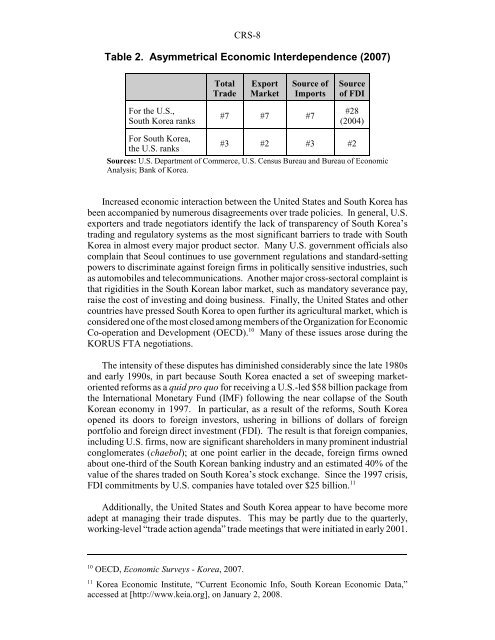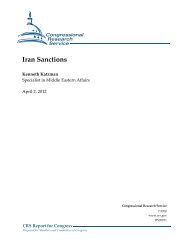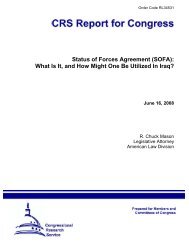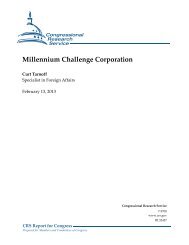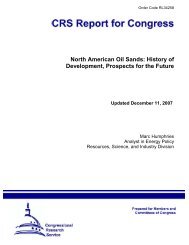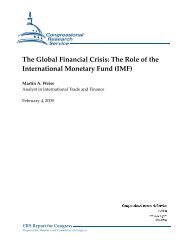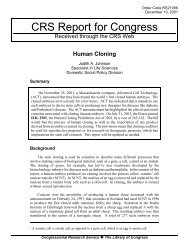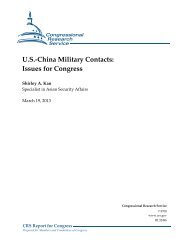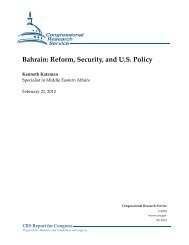The Proposed U.S.-South Korea Free Trade Agreement (KORUS ...
The Proposed U.S.-South Korea Free Trade Agreement (KORUS ...
The Proposed U.S.-South Korea Free Trade Agreement (KORUS ...
- TAGS
- korea
- fpc.state.gov
You also want an ePaper? Increase the reach of your titles
YUMPU automatically turns print PDFs into web optimized ePapers that Google loves.
10 OECD, Economic Surveys - <strong>Korea</strong>, 2007.<br />
CRS-8<br />
Table 2. Asymmetrical Economic Interdependence (2007)<br />
For the U.S.,<br />
<strong>South</strong> <strong>Korea</strong> ranks<br />
For <strong>South</strong> <strong>Korea</strong>,<br />
the U.S. ranks<br />
Total<br />
<strong>Trade</strong><br />
Export<br />
Market<br />
Source of<br />
Imports<br />
#7 #7 #7<br />
Source<br />
of FDI<br />
#28<br />
(2004)<br />
#3 #2 #3 #2<br />
Sources: U.S. Department of Commerce, U.S. Census Bureau and Bureau of Economic<br />
Analysis; Bank of <strong>Korea</strong>.<br />
Increased economic interaction between the United States and <strong>South</strong> <strong>Korea</strong> has<br />
been accompanied by numerous disagreements over trade policies. In general, U.S.<br />
exporters and trade negotiators identify the lack of transparency of <strong>South</strong> <strong>Korea</strong>’s<br />
trading and regulatory systems as the most significant barriers to trade with <strong>South</strong><br />
<strong>Korea</strong> in almost every major product sector. Many U.S. government officials also<br />
complain that Seoul continues to use government regulations and standard-setting<br />
powers to discriminate against foreign firms in politically sensitive industries, such<br />
as automobiles and telecommunications. Another major cross-sectoral complaint is<br />
that rigidities in the <strong>South</strong> <strong>Korea</strong>n labor market, such as mandatory severance pay,<br />
raise the cost of investing and doing business. Finally, the United States and other<br />
countries have pressed <strong>South</strong> <strong>Korea</strong> to open further its agricultural market, which is<br />
considered one of the most closed among members of the Organization for Economic<br />
Co-operation and Development (OECD). 10 Many of these issues arose during the<br />
<strong>KORUS</strong> FTA negotiations.<br />
<strong>The</strong> intensity of these disputes has diminished considerably since the late 1980s<br />
and early 1990s, in part because <strong>South</strong> <strong>Korea</strong> enacted a set of sweeping marketoriented<br />
reforms as a quid pro quo for receiving a U.S.-led $58 billion package from<br />
the International Monetary Fund (IMF) following the near collapse of the <strong>South</strong><br />
<strong>Korea</strong>n economy in 1997. In particular, as a result of the reforms, <strong>South</strong> <strong>Korea</strong><br />
opened its doors to foreign investors, ushering in billions of dollars of foreign<br />
portfolio and foreign direct investment (FDI). <strong>The</strong> result is that foreign companies,<br />
including U.S. firms, now are significant shareholders in many prominent industrial<br />
conglomerates (chaebol); at one point earlier in the decade, foreign firms owned<br />
about one-third of the <strong>South</strong> <strong>Korea</strong>n banking industry and an estimated 40% of the<br />
value of the shares traded on <strong>South</strong> <strong>Korea</strong>’s stock exchange. Since the 1997 crisis,<br />
FDI commitments by U.S. companies have totaled over $25 billion. 11<br />
Additionally, the United States and <strong>South</strong> <strong>Korea</strong> appear to have become more<br />
adept at managing their trade disputes. This may be partly due to the quarterly,<br />
working-level “trade action agenda” trade meetings that were initiated in early 2001.<br />
11 <strong>Korea</strong> Economic Institute, “Current Economic Info, <strong>South</strong> <strong>Korea</strong>n Economic Data,”<br />
accessed at [http://www.keia.org], on January 2, 2008.


